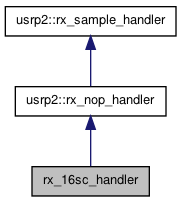rx_16sc_handler Class Reference
#include <rx_16sc_handler.h>
Inheritance diagram for rx_16sc_handler:

Public Types | |
| typedef boost::shared_ptr < rx_16sc_handler > | sptr |
Public Member Functions | |
| bool | operator() (const uint32_t *items, size_t nitems, const usrp2::rx_metadata *metadata) |
| ~rx_16sc_handler () | |
Static Public Member Functions | |
| static sptr | make (uint64_t max_samples, uint64_t max_quantum, std::complex< int16_t > *dest) |
Member Typedef Documentation
Reimplemented from usrp2::rx_nop_handler.
Constructor & Destructor Documentation
| rx_16sc_handler::~rx_16sc_handler | ( | ) |
Member Function Documentation
| static sptr rx_16sc_handler::make | ( | uint64_t | max_samples, |
| uint64_t | max_quantum, | ||
| std::complex< int16_t > * | dest | ||
| ) | [inline, static] |
| bool rx_16sc_handler::operator() | ( | const uint32_t * | items, |
| size_t | nitems, | ||
| const usrp2::rx_metadata * | metadata | ||
| ) | [inline, virtual] |
Function operator invoked by USRP2 RX API. Derived classes must override this method but then invoke it at the start of their processing. This operator will always be called at least once.
- Parameters:
-
items points to the first 32-bit word of uninterpreted sample data in the frame. nitems is the number of entries in the frame in units of uint32_t's. metadata is the additional per frame data provided by the USRP2 FPGA.
items points to the raw sample data received off of the ethernet. The data is packed into big-endian 32-bit unsigned ints for transport, but the actual format of the data is dependent on the current configuration of the USRP2. The most common format is 16-bit I & Q, with I in the top of the 32-bit word.
- Returns:
- true if the object wants to be called again with new data; false if no additional data is wanted.
Reimplemented from usrp2::rx_nop_handler.
The documentation for this class was generated from the following file:
